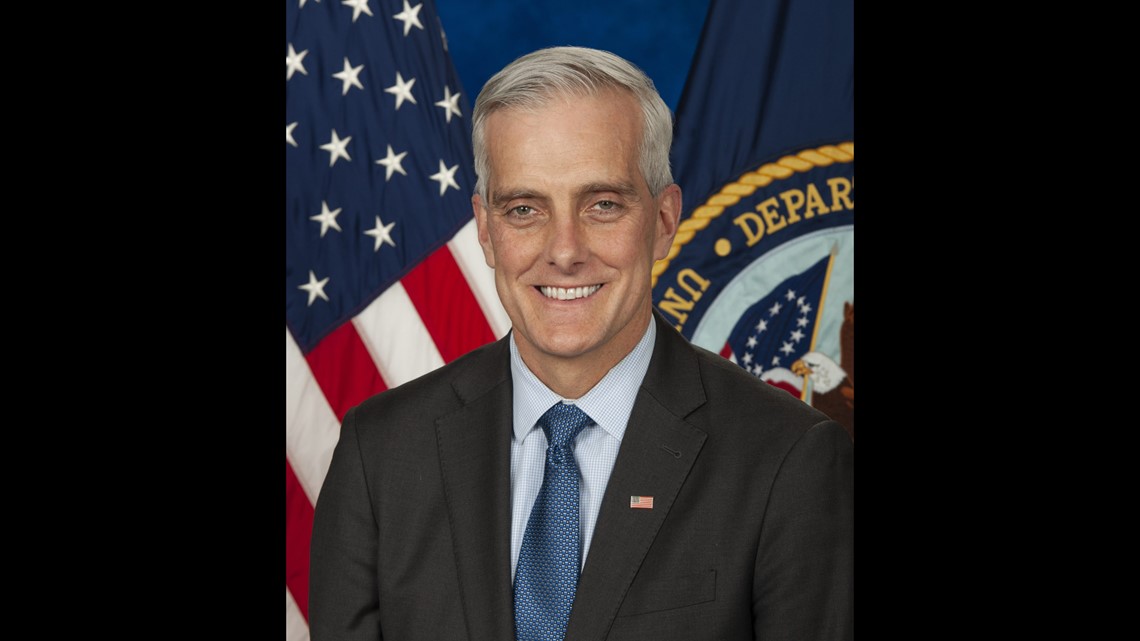SAN DIEGO COUNTY, Calif. — On Wednesday, lawmakers grilled the head of the U.S. Department of Veterans Affairs and asked him to explain questions raised in inewsource’s recent investigation about whether the VA is restricting veterans’ access to health care.
Denis McDonough, the Secretary of Veterans Affairs, attended a scheduled hearing to discuss the state of the department with the Senate Committee on Veterans’ Affairs. During the two-hour meeting, Republican senators pressed the secretary on the VA’s community care program — the subject of inewsource’s reporting — which allows veterans to access health care outside the VA’s hospitals.
After the hearing, the VA described several steps it has taken to address issues raised in the article to ensure former service members are getting the care they need.
Veterans health care has been a contentious issue in Congress for nearly a decade, with Republicans pushing for former service members to have more access to private care and Democrats trying to bolster the VA’s own hospitals with more resources and funding.
Community care was expanded significantly under the 2018 Mission Act, a bipartisan law meant to ensure veterans always have access to the treatments they need and don’t face long drives or wait times to see doctors. Under the law, veterans who meet any of six criteria are eligible to receive health care outside the VA, and the VA will pay for that care.
inewsource’s November investigation revealed publicly for the first time that VA administrators are overruling doctors and preventing them from sending patients to outside health care providers. Internal VA handbooks show the VA’s efforts are supposed to help the department make “good financial decisions” and “maintain funding of specialty care” in the future.
In the hearing, South Dakota Sen. Mike Rounds quoted the article, published in partnership with USA Today in print and online, and pointed out the examples of the VA denying veterans access to care outside its facilities.
Rounds, who voted against the Mission Act in 2018, read from a sample call script referenced in the investigation. The script is used by VA personnel when trying to persuade veterans to get their care inside the VA after they have already asked to go somewhere else.
The senator said he worried VA policies were taking away health care options from veterans.


“I really do think it should be the veterans choice, and yet I think a lot of veterans feel that’s not the way it is…” Rounds said. “I think we’ve got a serious problem here that’s not going to go away.”
VA Secretary McDonough said the department has taken inewsource’s investigation “very seriously” and worked with the San Diego VA “to get to the bottom of it, as you I think would expect us to do.” He added that VA staff have “dug very deeply” into each of the examples described in the story but said he could not provide more details.
“What I believe is that we are giving the best available care to our veterans, including historically high levels of care in the community,” said McDonough, a Biden-appointee who began his position in February.
Rounds read another section of the article to McDonough, including a quote from the San Diego VA’s chief of staff, who said the Mission Act has made the VA “worried that we’re not going to be able to pay our bills.” The chief of staff added that administrators are “regularly educating” doctors to help keep patients at VA hospitals.
“I think we’ve got a real problem, and I think it goes back down to dollars and cents,” Rounds said. “I have concerns that these examples are not isolated.”
Following the hearing, the VA elaborated on the steps the department has taken to address issues raised in inewsource’s project.
“Since the article, the San Diego VA Community Care Program has submitted requests for additional staffing to better meet customer service demands, which will address both patient and community provider needs,” national spokesperson Gary Kunich said in an email.


“The San Diego VA Community Care Program has also begun an Auditing and Compliance Program on December 1, 2021,” he added.
Nationally, the VA said, the department has changed its policies over the past year around a drug called ketamine to ensure veterans with treatment-resistant depression can access it through community doctors.
Prior to that change, inewsource reported that veterans in San Diego with severe mental illness were suddenly cut off from the treatment. Last month’s investigation revealed those denials happened, against the advice of the VA’s psychiatrists, because staff was overwhelmed with paperwork.
The federal health care system is educating employees so they know how to connect veterans with ketamine treatment outside the VA, Kunich said.
More than 9 million veterans are enrolled in the VA, the nation’s largest health care system, which is composed of more than 170 medical centers and 1,000 outpatient offices.
Explore the investigation
Read inewsource’s investigation into the VA health care system here. To explore the audio, video and other parts of the investigation, visit our project landing page.
Last year, veterans made more than 33 million visits to non-VA providers, representing about a third of all care paid for by the VA, according to numbers McDonough provided senators before the hearing. McDonough said these community appointments are “absolutely a critical tool for us” to help the VA deliver low-cost care to veterans.
The secretary said it’s up to veterans — not VA personnel — to choose where they go for their health care, and department policies have not taken that choice away. He pointed out that the VA spent more than $2 billion on outsourced medical care in the month of September, calling it “a significant investment.”
McDonough also emphasized that VA satisfaction ratings are high and cited a federal report showing veterans health care is more coordinated when patients stay inside the VA system, because it’s easier to share treatment plans and test results.
“That’s not to say there aren’t problems. There are. It’s a big system, and when I find a problem, I snuff it out. But to suggest that by design we’re breaking the law is an overstatement.”
Kansas Sen. Jerry Moran, the ranking committee member for the Republican Party, began his opening statements by sharing his own concerns about veterans accessing care outside the VA.
Moran said he continues to hear of examples through his office and in the media of the VA “discouraging the use of community care and even overruling clinicians who seek community care for their patients.”
Two months ago, the senator asked the VA to address his questions about community care, following up with a written request on Nov. 12th, which cited inewsource’s investigation. The reporting “further heightened” his concerns about VA health care, he wrote, and he has “struggle(d) to understand the VA’s intentions without additional information.”
Moran said his inquiries went unanswered until the afternoon before the hearing. He said he wasn’t given enough time to analyze the department’s responses and engage in an informed discussion, and he insisted the VA provide quicker answers.
Throughout the hearing, lawmakers asked the head of the VA to explain troubling trends in their districts. Tennessee Sen. Marsha Blackburn said it is a “far too common occurrence” that eligible veterans are not offered care options outside the VA. Sen. Dan Sullivan, from Alaska, said doctors are withdrawing from the VA’s community care program because of difficulty getting bills paid.
In mid-October, the VA announced it will be phasing out community care offices over the next year and restructuring their responsibilities in order to “operate as a high-reliability, veteran-centric organization.”
Asked by North Carolina Sen. Thom Tillis what the impact would be on veterans, McDonough said it would “reduce the overhead around the decision-makers” and make it easier for veterans to understand their health care choices.
Secretary McDonough told senators who raised questions about community care that he would continue discussing the topic with them in the future.
“I really think that this question about, as we’ve discussed, how we provide care, where we provide it, is one that benefits from our debate,” McDonough said.
Coming into the new year, the secretary said, the VA’s top priorities are offering “timely access to world class health care” and “timely access to world class benefits.”
If the VA can’t do that, McDonough said, “anything else we do won’t matter.”
WATCH RELATED: Congress scrutinizing VA following inewsource investigation (November 2021)



